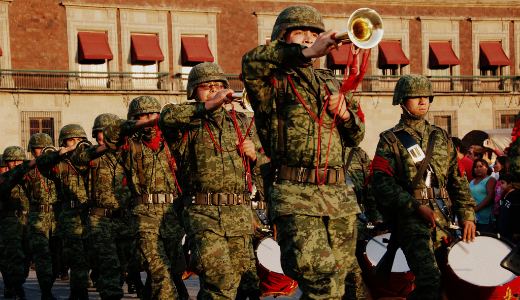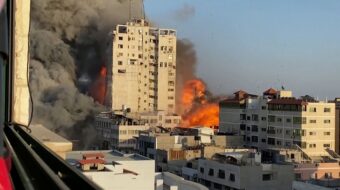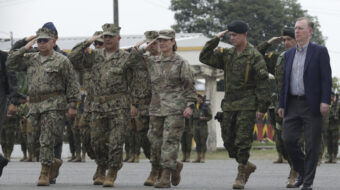
Over the last couple of weeks, more than 183 bodies, thought to be of migrants kidnapped en route to the U.S.-Mexico border, have been found buried in common graves near San Fernando, in the northeastern Mexican state of Tamaulipas. These are in addition to the 72 bodies of immigrants from Central and South America, who were found nearby in the summer of last year.
These individuals were kidnapped, sometimes by the busload, by drug traffickers, probably the “Zetas.” A possible motive is to force their relatives to pay ransom. Sometimes the gangsters kill the migrants if they refuse to work for them. Another motive may be simple highway robbery. The social disruption is immense, with the main highway from Matamoros, opposite from Brownsville, Texas, to the Mexican interior now being navigable only by armed convoys.
These are only a few of the 34,000 or more people who have been murdered in Mexico since President Felipe Calderon of the right-wing National Action Party (PAN) came to power in 2006, and declared a “war” against drug trafficking. The Bush and Obama administrations have poured millions of dollars into Calderon’s “war.” And now it is being used as a pretext to give the armed forces and security services a dangerous amount of unaccountable power that some say could lead to a police state.
A new “National Security Law,” which the PAN and the formerly ruling Revolutionary Institutional Party (PRI) are trying to fast track through the Mexican Congress this week would give the military and the state security agency Cisen the right to use force to deal with “movements or conflicts of political, electoral, labor or social nature” on the simple declaration that they constitute a national security threat, says CIP Americas.
Opposition legislators from the Revolutionary Democratic (PRD), Labor and Green parties oppose the legislation. Calderon’s government has a history of criminalizing dissident labor unions, as shown by its nonstop persecution of both the Mine and Metal Workers Union and the Electricians Union (SME).
Opposition to militarization of the anti-drug fight is growing. On April 21 there were demonstrations against it all over Mexico, organized by the poet Javier Sicilia, whose son was murdered by drug traffickers. The demand is the demilitarization of the anti-drug effort, an effort that has also led to many violations of human rights.
Jesus Zambada Niebla, son of a leader of the Sinaloa cartel, awaiting trial in the United States, claims that from 2004 to 2009 he was a U.S. “asset,” working with approval from the F.B.I., the Drug Enforcement Agency and the Immigration and Customs Enforcement Agency, and that both the U.S. and Mexican government are actually favoring a victory of the Sinaloa drug lords over their rivals, on the theory that if there were just one cartel, things would be more peaceful, according to Narconews.
One must be cautious in evaluating these statements. But there is the precedent of General Jose Gutierrez Rebollo, head of Mexican counter-narcotics in the late 1990s, and now serving a 30-year jail sentence. While striking blows against some of the cartels, he was discovered to be living in a luxury apartment paid for by the Juarez Cartel. So he was being rewarded by one cartel for destroying its rivals.
“Operation Fast and Furious,” a program formerly run by the U.S. Department of Justice, is a big scandal. In this program, U.S. agents allowed the trafficking into Mexico of large numbers of high powered automatic weapons purchased at gun stores in the U.S., on the theory that it would help them to track these weapons and thus understand the distribution networks. Apparently, the Mexican government was never informed abut this risky strategy, which led to many deaths, including that of a U.S. agent. According to CIP Americas, Attorney General Eric Holder has ordered the program stopped and investigated.
What alternative tactics are there to declaring “war” on drugs, a war that is tearing the country apart and also causing wide disruption and bloodshed in the Central American countries through which the drugs, originating in Colombia, have to pass?
The Mexican and U.S. governments could put more resources into shutting down the financial mechanisms by which drug money is laundered.
The United States could do something about the cross-border gun trade. Even though some of the weapons used by drug cartels originated in the Contra Wars in Central America, Operation Fast and Furious shows that there is a significant southward movement.
The United States could do far more to dry up the demand by increasing resources for drug abuse prevention and education and rehabilitation. But things are trending the other way, as states cut back their drug prevention and rehabilitation budgets. And the budget proposed by the U.S. government still is relatively weak on prevention and rehabilitation.
Bringing undocumented immigrants “out of the shadows” would undercut the traffickers’ exploitation of immigrants. But quick passage of immigration reform in the U.S. Congress seems unlikely under current political conditions.












Comments